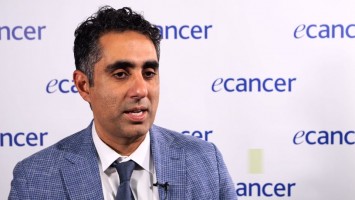Personally I’m now a member of the DKTK School of Oncology and so we were offered to go to this course especially to really learn about all of the broad problems, maybe, also in modern oncology and also to learn about what is going on, what may be the challenges of the future. So for me it was a good chance because I’m a medical doctor by training but so far I didn’t really get into this oncology field so deep because I’m only working on medical imaging. So it was a really good chance for me to get an overview about what was going on now.
What expectations did you have of the course and were they fulfilled?
My expectations were that I could get really a very good overview about translational medicine, like how the field would basically develop, how it had developed already until then. I can get a real overview from really high profile speakers and some other basic information about all that was going on because we all come from very different fields and so it would be very good to have some sort of common ground to really start from. I think that was very well fulfilled and very nice actually, yes.
What will you take away from the course?
I think I’ve learned a lot, apparently, and because there were really a lot of things covered. So that was the one thing - it’s really a wide field, it’s a very complicated field now, you have to have knowledge about a lot of things. So I learned especially that cancer is just not… it’s a very diverse thing, there is no such thing as one human cancer but there are a lot of different cancers. All the treatment, even with new technologies and new agents, is still difficult. You have to explore more, you have to learn more about cancer, maybe about the differences of cancers. That was maybe the most impressive thing, to really see how the diversity is and also, maybe for myself, how I can maybe fit in to somewhere in this and I can have a benefit or something for this also to maybe get some advance in the field. I will see, it’s still challenging and it’s going to be challenging for society because it’s always a question of if it’s efficient or not. So it’s a big challenge but I think it’s worth to go after it.
Did any of the talks stand out?
René Bernards, because he was very entertaining and he was also very vivid and scientifically was very interesting and he was a good… give you some of the enthusiasm about it, like why he loved to be in this field even if it’s very challenging. That was one thing but there were a lot of other talks that went very well.
What do you think this course offers that others do not?
So far I’ve been on not too many of those translational courses especially, but rather to more image-centred courses. So for me that was really a big chance to get into the translational field specifically. So that was very good for me to just have a really good overview because just translational medicine, as it says, is coming from basic science which I’m usually mostly doing to really see where the challenges are for this translation into the clinic and everything.
Would you recommend this course to others?
I think I would recommend it because it’s a very comprehensive course, it covers a lot of things which are all very relevant. There are a lot of high profile speakers, I can say, and they know what they’re talking about of course. They also can give you other interests and most of them are really also very enthusiastic about what they say.








